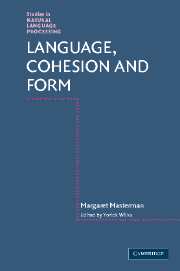Book contents
- Frontmatter
- Contents
- Preface
- Editor's introduction
- Part 1 Basic forms for language structure
- Part 2 The thesaurus as a tool for machine translation
- Part 3 Experiments in machine translation
- Part 4 Phrasings, breath groups and text processing
- 9 Commentary on the Guberina hypothesis
- 10 Semantic algorithms
- Part 5 Metaphor, analogy and the philosophy of science
- Bibliography of the scientific works of Margaret Masterman
- Other References
- Index
9 - Commentary on the Guberina hypothesis
Published online by Cambridge University Press: 22 September 2009
- Frontmatter
- Contents
- Preface
- Editor's introduction
- Part 1 Basic forms for language structure
- Part 2 The thesaurus as a tool for machine translation
- Part 3 Experiments in machine translation
- Part 4 Phrasings, breath groups and text processing
- 9 Commentary on the Guberina hypothesis
- 10 Semantic algorithms
- Part 5 Metaphor, analogy and the philosophy of science
- Bibliography of the scientific works of Margaret Masterman
- Other References
- Index
Summary
There are two reasons why I am writing this preface to a presentation of Peter Guberina's hypothesis that there exists a single formula for semantic progression at the basis of all human communication. I think, firstly, that this hypothesis, whether universally true in its present form or not, represents a new generative idea of the first magnitude in the basic research of the mechanical translation field.
It is insufficiently appreciated by workers in other fields how many fundamental new basic hypotheses of the nature and characteristics of human communication MT research has already thrown up. There is the CLRU (and others') idea that a semantic system of thesaurus type can be mathematically represented by a lattice, algorithms done on it, and a mathematics of semantic classification built up from it; there is Yngve's hypothesis of the ‘limit in depth’, which must occur in the grouping on linguistic units within sentences; there is A. F. Parker-Rhodes' (and my) idea of the applicability of the mathematical notion of lattice centrality to the notion of exocentric syntactic form; there is Ida Rhodes' idea that quite simple conditional probability chains can be used in doing syntactic analysis (because that is what her idea really is); there is Chomsky's idea that a full language can be mechanically constructed by deriving it mathematically from a small set of kernels; and now there is this Guberina hypothesis that there must exist one and only one basic form of semantic progression (which is both quite simple and also formalisable at the basis of all human communication). There is current widespread detraction of the MT field because of the false claims that have been made on behalf of the present state of the art in political quarters and in the popular press.
- Type
- Chapter
- Information
- Language, Cohesion and Form , pp. 227 - 252Publisher: Cambridge University PressPrint publication year: 2005



